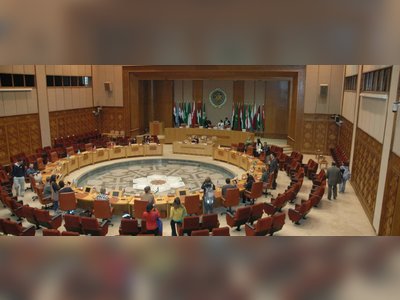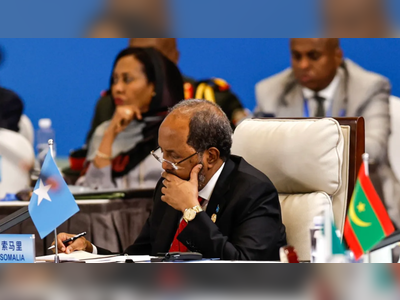U.S. Supreme Court Denies Trump's Appeal to Delay Sentencing in New York Hush Money Case
President-elect's legal team fails to secure postponement, as Supreme Court clears path for sentencing amid transition to presidency.
In a closely contested decision, the U.S. Supreme Court has denied President-elect Donald Trump's final attempt to delay his sentencing in a high-profile New York hush money case.
The 5-4 ruling, delivered on Thursday, permits Judge Juan M.
Merchan to proceed with the sentencing scheduled for Friday, just days before Trump is due to assume the presidency once more.
The case revolves around a $130,000 payment made to adult film actress Stormy Daniels, which prosecutors allege was an effort to silence claims of a past liaison, allegations Trump has consistently denied.
Despite the conviction on 34 felony charges related to falsifying business records, Judge Merchan has indicated that Trump will not face incarceration, financial penalties, or probation.
The legal team for Trump, led by D.
John Sauer, sought a delay, citing potential distractions during the presidential transition and ongoing appeals challenging the verdict.
The Supreme Court's split decision saw Chief Justice John Roberts and Justice Amy Coney Barrett siding with the three liberal justices to uphold the sentencing timetable.
The majority rejected the emergency motion to delay, emphasizing that the appeals process could adequately address the defense's arguments.
Conversely, Justices Clarence Thomas, Samuel Alito, Neil Gorsuch, and Brett Kavanaugh favored postponing the sentencing process.
Trump's legal strategy has centered on arguments that evidence admitted in the Manhattan court proceedings contravened a Supreme Court ruling granting broad prosecutorial immunity for presidential acts.
The Supreme Court's recent decisions have been marked by a conservative majority alignment favoring Trump in other legal arenas, including ballot inclusion and immunity concerning actions taken during his presidency.
Thursday's ruling marks a notable exception, potentially influencing dynamics as the presidency transitions.
The convictions were determined to pertain to Trump's personal matters, distinct from his presidential duties.
Despite the legal setbacks, Trump expressed respect for the court’s determination, articulating intentions to continue pursuing an appeal on broader legal principles.
Amidst these developments, the Supreme Court's decision introduces an added layer of complexity to Trump's imminent inauguration and the transition period.
While Trump's legal representation described the case as politically motivated, prosecutors have opposed delays, arguing that the sentencing process, entailing a brief virtual hearing, should not unduly impact the forthcoming presidential assumption.
The decision arrived just a day following revelations of communication between Justice Alito and Trump, which Alito characterized as unrelated to current or impending legal proceedings.
This unusual interaction has sparked controversy, raising calls for potential recusal from related cases by members within political circles.
This chapter in Trump's legal saga continues to unfold against a backdrop of broader legal battles and political dynamics likely to capture national and international attention.
The 5-4 ruling, delivered on Thursday, permits Judge Juan M.
Merchan to proceed with the sentencing scheduled for Friday, just days before Trump is due to assume the presidency once more.
The case revolves around a $130,000 payment made to adult film actress Stormy Daniels, which prosecutors allege was an effort to silence claims of a past liaison, allegations Trump has consistently denied.
Despite the conviction on 34 felony charges related to falsifying business records, Judge Merchan has indicated that Trump will not face incarceration, financial penalties, or probation.
The legal team for Trump, led by D.
John Sauer, sought a delay, citing potential distractions during the presidential transition and ongoing appeals challenging the verdict.
The Supreme Court's split decision saw Chief Justice John Roberts and Justice Amy Coney Barrett siding with the three liberal justices to uphold the sentencing timetable.
The majority rejected the emergency motion to delay, emphasizing that the appeals process could adequately address the defense's arguments.
Conversely, Justices Clarence Thomas, Samuel Alito, Neil Gorsuch, and Brett Kavanaugh favored postponing the sentencing process.
Trump's legal strategy has centered on arguments that evidence admitted in the Manhattan court proceedings contravened a Supreme Court ruling granting broad prosecutorial immunity for presidential acts.
The Supreme Court's recent decisions have been marked by a conservative majority alignment favoring Trump in other legal arenas, including ballot inclusion and immunity concerning actions taken during his presidency.
Thursday's ruling marks a notable exception, potentially influencing dynamics as the presidency transitions.
The convictions were determined to pertain to Trump's personal matters, distinct from his presidential duties.
Despite the legal setbacks, Trump expressed respect for the court’s determination, articulating intentions to continue pursuing an appeal on broader legal principles.
Amidst these developments, the Supreme Court's decision introduces an added layer of complexity to Trump's imminent inauguration and the transition period.
While Trump's legal representation described the case as politically motivated, prosecutors have opposed delays, arguing that the sentencing process, entailing a brief virtual hearing, should not unduly impact the forthcoming presidential assumption.
The decision arrived just a day following revelations of communication between Justice Alito and Trump, which Alito characterized as unrelated to current or impending legal proceedings.
This unusual interaction has sparked controversy, raising calls for potential recusal from related cases by members within political circles.
This chapter in Trump's legal saga continues to unfold against a backdrop of broader legal battles and political dynamics likely to capture national and international attention.











